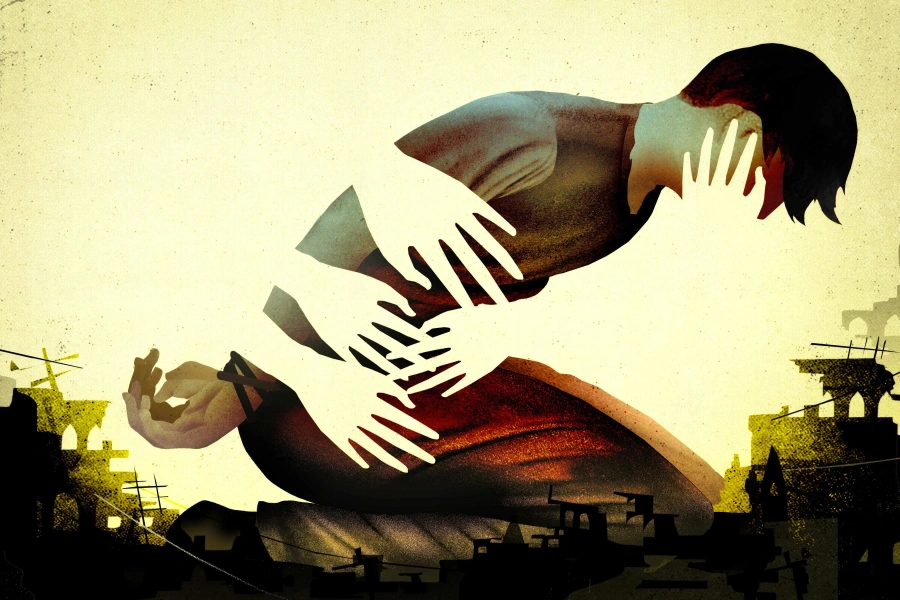“Most street children are now taking glue every day and quite frequently,” said Bijesh Shrestha, president of Child Protection Centre and Services (CPCS), which counsels homeless youth in the valley. [break]
“We now sometimes see well-dressed kids in school uniforms in residential areas sniffing glue. We were very surprised,” he said.
According to CPCS study among 302 children across major cities, including Kathmandu and Pokhara, 76 percent of street children are using glue on a regular basis. Its new report will be published next month.
It´s a statistic much higher than previously thought. Child Workers in Nepal´s (CWIN) landmark study in 2002 found half of Kathmandu´s street children were sniffing glue regularly.
First emerging as a Nepali drug trend in the late 1990s, glue abuse usually involves inhalation of chemicals glue such as Dendrite, Max Bone or even paint thinner from a paper bag, doused rag, or straight from the bottle.
Short-term effects are hallucinations, euphoria, aggression and reduced appetite, with long-term effects like brain damage, respiratory and organ failure, memory loss, and death.
Inge Bracke, acting country director of CPCS, said the problem “had gotten worse” in the last few years, with street children using it more frequently and in larger doses today.
She said children start this dangerous habit as young as seven or eight-year-olds due to a range of factors such as peer pressure, escapism, fun or to avoid hunger pains.
“At first they say sniffing glue made them feel unwell but then it turns into something pleasurable for them,” said Bracke.
Prashant (name changed), 11, has been living on Chabahil´s streets for over a year where he said he survives by begging and picking up garbage and plastic.
“We get stoned with dendrite, which makes us see what we want to see. Most often we´re flying in the sky, it´s so much fun,” he said.
Bracke and Shrestha said children first start as an initiation rite with older street kids or adults first giving them “food, drugs, and dendrite” to “train them for criminal activity”.
Bikash (name changed), 14, first ran away from home when he was in the third grade and now lives on the streets of Kathmandu among a gang of boys.
“The big boys love us. They help us when we are sick. We take dendrite, smoke cigarette and drink alcohol in group,” he said.
Bracke said apart from the very real threat of death and serious illness, the biggest problem with glue sniffing was the aggression it induced.
“Gang fights are normal on the street. There are many gangs in many place,” said Bikash of living day-to-day in the Valley.
Both CPCS and CWIN have been working to stop vendors selling adhesives to underage children, but admit prohibition is not the answer.
“Glue is only a symptom of the problem,” said Jean-Christophe Ryckmans, country director of CPCS International.
“Some people claim we should ensure shops don´t sell it to kids. I don´t have that opinion and for a simple reason: if you cancel glue, they will go for paint or any other solvents.”
Interviews in CPCS´ upcoming report depict a range of substances being used, including Vat, Foxciban, and Naitroson, some bought as cheaply as Rs 12 a bottle.
“They know [drug use] is not good for them but they can´t stop once they become addicted,” said Bracke.
“They hate society and society hates them,” she said of their predicament and added that punishing children for substance abuse was not the answer.
Ryckmans said society needs to focus on reasons behind children´s addiction - a lack of social integration and homelessness.
“I have to take some drugs to get through the whole day and forget the way people treat me,” said Himal (name changed) who has been living on the streets for over five years.
Ryckmans also said there needs to be a reduction in the innumerous NGOs in Nepal who claim to work for street children´s benefit but ultimately end up “doing nothing”.
Planting pots from old jar





































